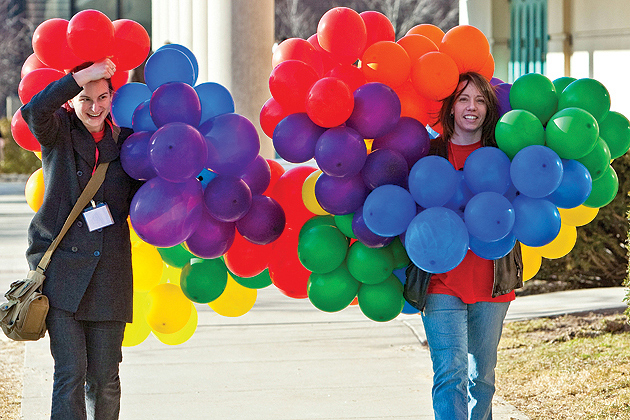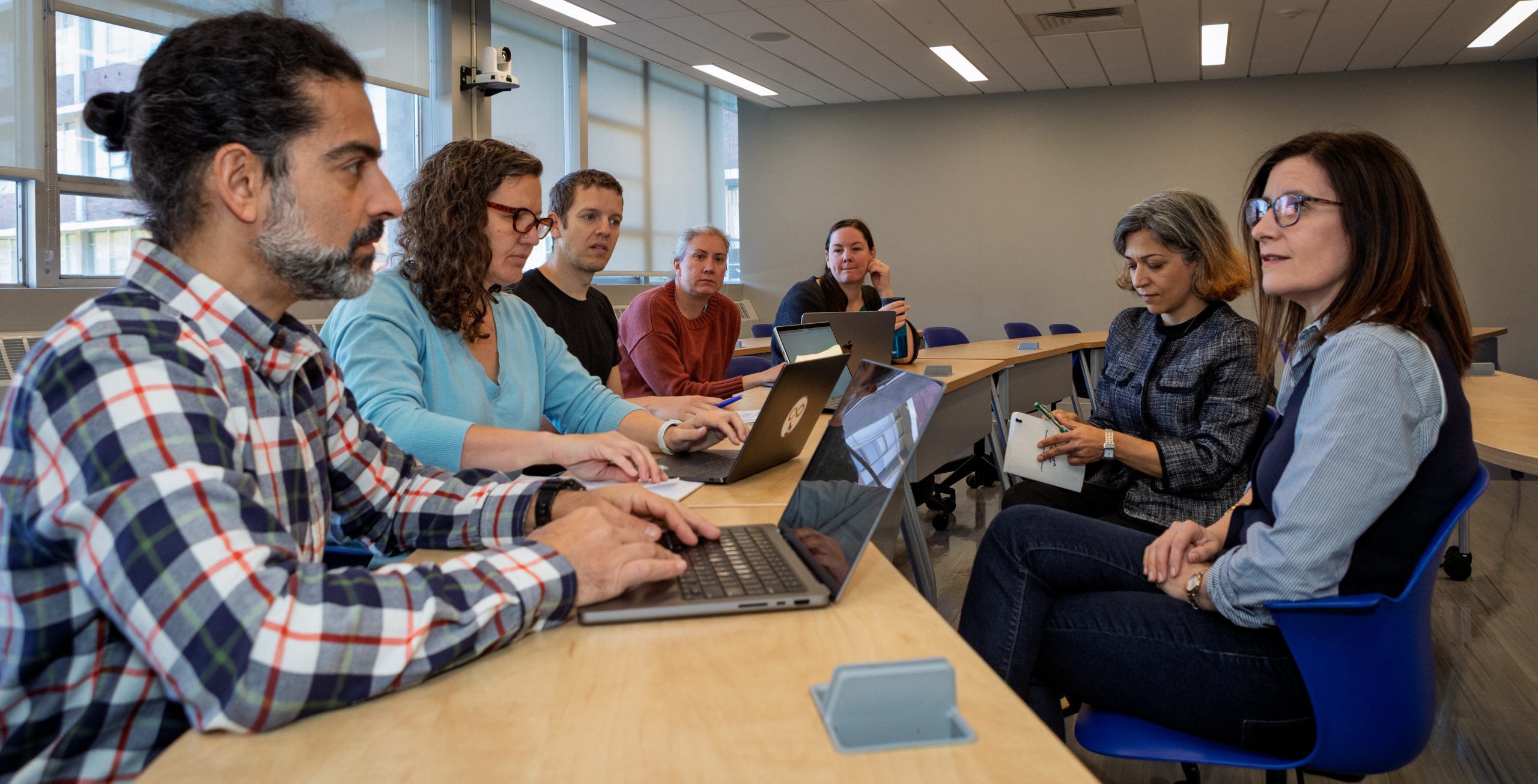
It’s not easy adjusting to college. But for Vu Tran ’10 (BUS), ’10 MS the usual challenges of navigating freshman year were complicated by the fact that he was in the process of coming out to his friends and family as a gay man.
“There were some awkward moments,” he recalls. “My roommates would be talking about the girls they liked; I’d be talking about guys.”
But an introduction to the Rainbow Center – UConn’s educational resource for the lesbian, gay, bisexual, and transgender (LGBT) campus community – helped him find his way. “The Rainbow Center gave me a niche and helped me get my legs under me,” he says.

After a rocky start, Tran excelled, not only academically, but socially. He reached out to the Women’s Center as a facilitator for its Violence Against Women Prevention Program. He became a “Sexpert” with the Health Education Office, a position for which he received a Peer Educator of the Year award. He mentored new students through the University’s First Year Experience Program and told his coming-out story to classes and groups as part of the Rainbow Center’s Speakers Bureau.
In 2008, Tran made UConn history when he became the first openly gay Homecoming King. “It was a really nice feeling,” he says. “Especially after not wanting to go to my high school prom or Homecoming dance because I was worried about what people would think about my date.”
Tran, who received his master’s degree in accounting at UConn last December and now works at Ernst & Young LLP, feels his story is not unusual. In the past decade, there has been a deliberate effort by the administration to address homophobia and make the campus a more welcoming environment for all students.
‘Enough is enough’
In 1999, The New York Times ran an article on the growing trend of gay-bias incidents on UConn’s campus. From chalking “If you’re gay, go away” on sidewalks to vandalizing doors of openly gay students, 21 incidents were reported to campus police that fall. That same year, the Princeton Review ranked the University No. 12 among the 20 most homophobic college campuses in the country.
In response, students organized a rally in support of the LGBT community and presented a list of demands to then-president Philip Austin. The response by the administration was immediate. Austin released a statement deploring the incidents and proposed four steps to counter gay-bias acts: advocating immediate police investigation, making diversity part of the learning experience, fostering a community atmosphere, and proclaiming an act against one group as an act against the entire campus.

“The Times article provided traction for a movement to make UConn more LGBT-friendly,” says Fleurette King, Rainbow Center director.
Adds Bill Hickman ’05 (BGS), the Rainbow Center’s administrative assistant, “The University said ‘enough is enough.’ That’s when things started to change.”
Today, UConn is listed in The Advocate College Guide for LGBT Students; and the LGBT-Friendly Campus Climate Index, an online resource, gives the University a 4.5 out of 5 rating.
“It didn’t just happen,” says John Saddlemire, vice president for student affairs. “It was a quiet, concerted effort by a lot of people who went back and re-examined the way we were doing things in an effort to make the campus more user-friendly and accepting.”
The Rainbow Center, which opened one year before the 1999 rash of bias incidents, exemplifies the change seen on campus in the past decade.
“We started with one room,” says Margaret Breen, professor of English in the College of Liberal Arts and Sciences and associate department head, who named the Center. “The ‘closet’ metaphor would not have been a stretch.”
Now occupying a suite of offices in the Student Union, the Center is a haven for LGBT students and their allies.
“I can always count on my friends at the Rainbow Center,” says Alycia Washington ’12 (CLAS), a psychology major who works at the Center. “Fleurette is just the best boss-mom-sister ever. She and Bill are the perfect tag team. Even if you don’t realize it, they’re helping you. They’re always out and about on campus.”
The Center’s weekly “Out to Lunch” lecture series – which students can take as a three-credit class – hosts speakers on topics related to queer studies, from the high incidence of suicide in gay youth to the origins of homoerotic literature. And they offer training to campus constituents who wish to become allies to the LGBT community.
Through the Rainbow Center, students have access to an extensive library of LGBT-related literature and can join a number of support and social groups, including My Soul, for LGBT campus members of color, and Queers United Against Discrimination (QUAD).
No Longer Feeling Alone
But the Rainbow Center isn’t the only avenue of support for the LGBT campus community.
Some students may not be ready to identify with a particular group. Kristin Van Ness ’09 (CLAS) found her safe haven at the Women’s Center. “There wasn’t an assumption about why I was walking in there,” she says.
Van Ness, a psychology and human development and family studies double major, attended the Between Women support group “for women who love women or think that they might.” It was there that she realized she wasn’t alone.
“It was this amazing realization that I’m not the only person who feels this way,” she says. Listening to group members tell their coming-out stories helped Van Ness normalize her experience: “For the first time, I felt like a completely normal human being.”
The Women’s Center, which opened its doors in 1972, promotes educational advocacy around gender equity, and that includes LGBT issues, says Kathleen Holgerson, the Center’s director. “You can’t serve one part of the spectrum without concern for all of the spectrum,” she says. The Between Women support group has been part of the Center since 1994, the year Holgerson came to UConn.
When Cassy Setzler ’12 (CLAS) came to UConn, she was not sure how to get involved. On a whim, she applied for a position as a Sexpert with the Health Education Office. “It was something new, something I hadn’t done before. At that point, I hadn’t even come out to myself,” says Setzler, a double major in psychology and human development and family studies.
Trained by Joleen Nevers, UConn’s health education coordinator, Sexperts are peer educators who present programs in residence halls and to various campus groups to help promote positive and responsible sexuality and create awareness of sexuality issues. The program has received regional and national awards, says Nevers.

Unsure of her sexual orientation, Setzler found the support she needed in Nevers and the Sexperts program. “They really didn’t care how I identified,” she says.
“We teach sex education while keeping in mind all the different expressions of sexuality,” says Nevers. “We are very careful about our language at the Health Education Office. We don’t want to exclude anyone.”
In her sophomore year, Setzler became involved through the Rainbow Center with Shades of Grey, a support group for people who love more than one gender, which she still helps run. Setzler also is a part of the Rainbow Center’s Speakers Bureau, through which she had the opportunity to speak about her coming-out experiences in one of her own classes. “People had no idea. They were so surprised when they saw me get up and walk to the front of the class.” Being a peer educator is therapeutic for Setzler. “Every time I tell my coming-out story, it gets more normal. It helps me feel like I’m doing OK.”
Challenging Presumptions
Campus centers and offices – like the Rainbow Center, Women’s Center, and Health Education Office – have done much to support and advocate for the LGBT community. But there is also an intellectual piece, says Breen, a specialist in LGBT literature and gender theory who teaches Introduction to LGBT Literature, which she pioneered in 1995, and Genders and Sexualities, a course that consistently fills to capacity.
“There’s a huge need for LGBT students to have an intellectual framework where they see themselves in the world,” Breen adds.

Nancy Naples, professor of sociology in the College of Liberal Arts and Sciences and director of the Women’s Studies Program, says “it’s important for all students to examine the hetero-normative aspect of our society. Classes [on gender and sexuality] provide a place for students to challenge their presumptions.”
Christine Wilson, director of student activities, says “We need to challenge students to think of things from different points of view. That’s what college is for.” Wilson oversees UConn’s alternative spring breaks, which includes a program on gender and sexuality where students can volunteer at the True Colors Annual Conference, an LGBT youth conference held on UConn’s campus.
Twelve years after The New York Times article appeared, there are still challenges on campus. “We’ve made some excellent changes,” says Nevers, “but bias incidents still happen.” However, the University remains steadfast in its commitment to move forward.
“Our goal is to provide all students with successful academic experiences,” says Saddlemire. “And that includes our LGBT community.”



